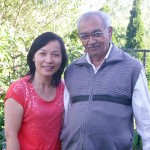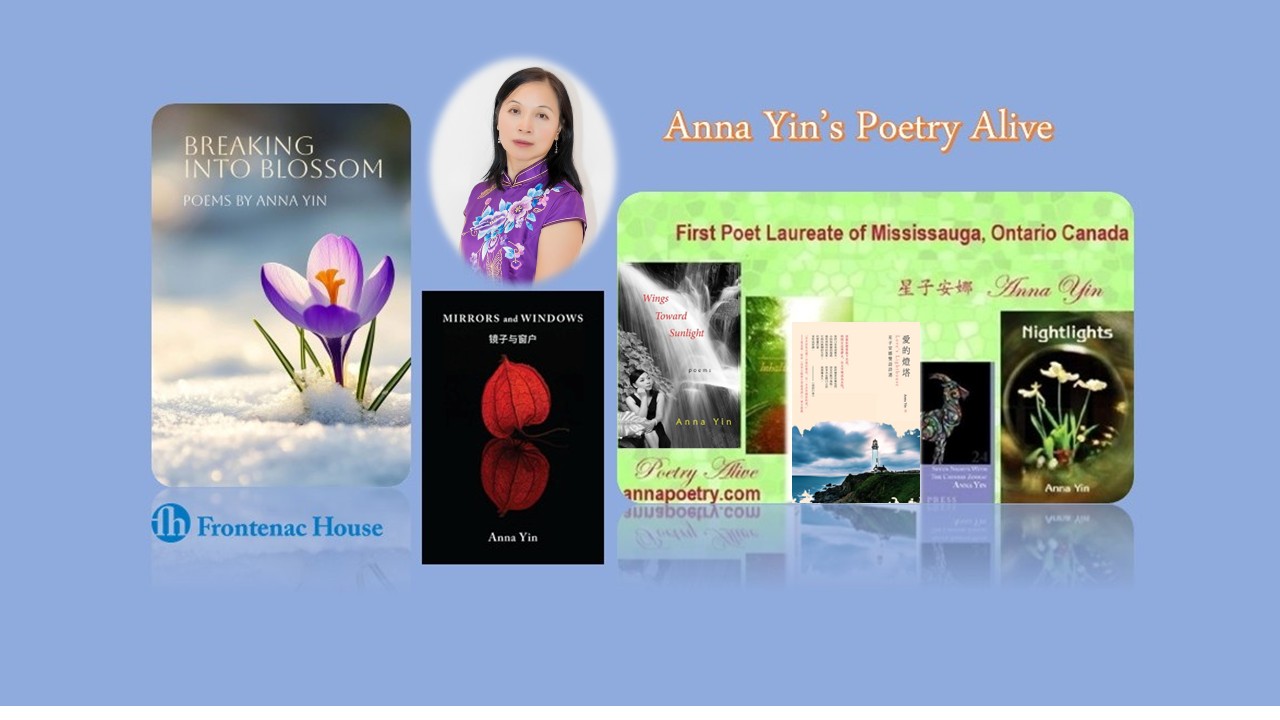 Professor Shankarlal Purohit will publish my poems and an interview by him in Hindi in his magazine (Vishwamukti) in India for a national conference there on Oct 24,2013. With his permission, here are his introduction and interview in English.
Professor Shankarlal Purohit will publish my poems and an interview by him in Hindi in his magazine (Vishwamukti) in India for a national conference there on Oct 24,2013. With his permission, here are his introduction and interview in English.
Thank you Mr. Purohit! Here is a photo taken at my back yard.
Mr. Purohit’s Introduction
“Anna writes poetry in “Wings towards sunlight”. True, she has Li Po in her lines, so also the bodhi tree and so on. This is a poetry written from a thousand flower’s fragrance. It is not a negative voice. No doubt full of life in every syllable she writes, as unfolding in her laughter when you talk to her personally.
Initially reader finds a fish in the traditional sense, but at the end of the first collection, there is a metamorphosis of a caterpillar into a butterfly. Anna started sensing the silence. However admits, I am unable to lift my shadow. She should understand a poet need not lift any shadow, you walk towards sunlight and shadow will follow you, it walks along with you.
Anna understands, it is time to sow seeds, there will be germination and new banyan tree,a new peepal tree(bodhi tree)will emerge out, grow slowly but steadily. but this time her journey should be in west also. She had breathed poplar and so on, there is vast expanse of nature in west also. It’s equally charming , uplifting as it is in east. She herself admits the weather is beautiful.
She writes poems , no longer than a page. Perhaps she is not interested in long long expressions. Obviously brevity is a unique quality in her.
Anna, you are not a mythografer of love. You desire ‘to dance, to understand the myth of love,’ it is because you just before you said ‘waits for loves arrival.’ But your poetry is utterance of ….. it has arrived long ago and you are wandering like a musk deer searching the fragrance in grass , on top of tree, everywhere.”
Interview
- Well, fish is so dear to you! But in your second collection it has drowned or it is exhausted?
Interestingly other readers also have observed my Fish and asked the same question. Indeed, “fish” is very dear to me. In my first collection “Wings Toward Sunlight”(Mosaic Press 2011), the fish image recurs in several poems and has a major role, although each time with different characteristic. You can view “fish” as my self image, with a soft voice to express the feeling of sympathy, that longing for adventures and wish for a soul mate. In my second collection “Inhaling the Silence”(Mosaic Press 2013) fish appear several times, but only in a supportive role. The “Moon” takes a major role and presents many faces. Why? Personally I don’t think the “fish” is exhausted or drowned, it just needs a break, and for that my view shifts to the wider sky…As with the moon, a cosmos is there to communicate.
- Bodhi Tree! Do you mean a religion image by this? Is religion still relevant today?
I am open to all religions. I find that all are interesting and fascinating; however I think Poetry is my religion. When I write poems, I use my own poetic license to mix religious cultures. I wrote the poem Bodhi Tree because I like the idea in Buddha’s philosophy of letting go and freeing oneself, but you also can see there is a transforming of feeling and ideas there. I think religion is still relevant today and everyone needs to believe something to have hope.
- Do you think poetry have a land? Or universal? (e.g. China, India, Canada etc.)
I think you can say poetry has its own land depending on its voice. But some poetry has a voice that is universal and beyond time. Some critics think my voice is international because I bridge eastern and western cultures, blending them through my own voice.
- How Modern poetry differs from earlier one in your experience?
I started writing poetry with little knowledge about western poetry, especially modern western poetry. Words and images came to me and I simply trusted my intuition and wrote them down in English. Later on, I took six courses in creative writing at University of Toronto. It helped to broaden my view and break through my limitations. I think Modern poetry differs from earlier poetry in many ways, not just style and syntax. Poets nowadays seem more detached themselves from what they write. The way I write is different from them. But surely you can find many kinds of poem in modern poetry.
- Is future of poetry bright? (i.e. read by more people, more books of poetry will be sold, more discussion about poetry and more variation in poetic form)
From what I have experienced, there are more poetry events and more people read poetry in Toronto and other cities in Canada nowadays. There is also more variation in poetic forms, including collaboration with painting, photograph, music and dance performance.
I believe there is always a future for poetry, bright or not, we will see. No matter what happens, since poetry has become a very important part of my life, I will continue working on Poetry Alive education programs to promote poetry to the general public and encourage the multicultural dimensions of poetry in book form, multi-media form and other new form as well.
- A few words about yourself as appreciated in today’s world of poetry.
I am grateful that my poetry not only opened a door for myself, it also saved a lady’s life. I know every poet wants to be appreciated for his/her poetry. I am glad that my poetry has been recognized and has won awards. My voice gets stronger and more mature; it has been well received in today’s poetry circles. As Richard Greene wrote in his introduction to my second collection: “I am very hopeful of what the future holds for her”. I too want to explore what the future holds for me.
